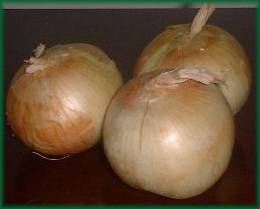|
Gardens Ablaze |
||
|
|
Onion
|
|
|
Detailed Vegetable Profiles Site Map
Home
|
The color of an onion gives you some insight into it's properties. The white onions are the strongest, followed by yellow, with red or purple being the mildest-flavored types. The length of day affects the growth of some onions, so when buying onion sets or seeds, be sure to find out whether the onion in question is appropriate for your area. Some do better in the south and others do better in the north - and some do well anywhere. Onions can be started from seed or from sets. Sets are slightly more expensive but give a much quicker result than seeds. In the south, they can be planted in the fall for a spring harvest, but in the north, early spring is the best time to plant. When planting sets, be sure that you plant the bulblet with the pointed end up. Onions prefer rich, well-drained, moist soil. They are an easy plant to grow and require little maintenance other than weeding once planted. Harvest young scallions at any time. To harvest mature bulbs, wait until the tops begin to yellow. Knock the plants down and leave them there for a couple of days. Then carefully pull the plant. Move harvested bulbs to a dry area and set them on a screen for a few days for drying. They can then be braided together or placed in mesh bags for storage. They keep well if stored properly, and do not keep well in the refrigerator. Some onion family members make nice additions to the ornamental garden, including ornamental onion, chives, garlic chives, and society garlic (please also see Landscaping with Herbs for more information). In addition to providing a nice cottage-garden look, the tops can be snipped for use in soups and salads whenever the mood strikes. More information on Onions is available in the Gardening QA Section. Click here to see what other gardeners are asking. Medicinal Properties: Onions have been used for their medicinal properties for centuries. They have anti-bacterial and anti-fungal properties, and a paste or Ointment made out of onion is said to prevent infection in wounds and burns. Another use externally for age spots, warts, or freckles is to mix onion juice with vinegar and rub on the affected areas. One amusing bit of folklore says that if you put onion juice on your head and then sit out in the sun, you can cure baldness.... Onions and all the other members of the Allium family are thought to have some impact on high cholesterol and blood pressure. An onion Tea can be made and used daily, but I'm not sure how that would taste. The prudent thing for blood pressure and high cholesterol is probably to just include onions in your diet at every opportunity. Unfortunately, the down side to this is that onion compounds travel through the body when ingested and it takes time to process them out through sweat or breathing. Just brushing the teeth doesn't make the odor go away. So, you'll live to a ripe old age, but nobody will want to be around you..... Maybe there's a happy medium somewhere in there, but do experiment with onions and their extracts if you have blood pressure or cholesterol problems. Onions are perfectly safe for ingestion and as such, you can experiment with different ways to make them work for you. More information on Onions is available in the Gardening QA Section. Click here to see what other gardeners are asking.
Custom Search
|
|
|
Gardens Ablaze |
||
 Onions
are so commonplace in today's society that we tend to forget their importance
and the variety of uses they have. They are valuable culinary vegetables,
and also have medicinal value. Some make ornamental contributions
to the garden, and they are important
Onions
are so commonplace in today's society that we tend to forget their importance
and the variety of uses they have. They are valuable culinary vegetables,
and also have medicinal value. Some make ornamental contributions
to the garden, and they are important